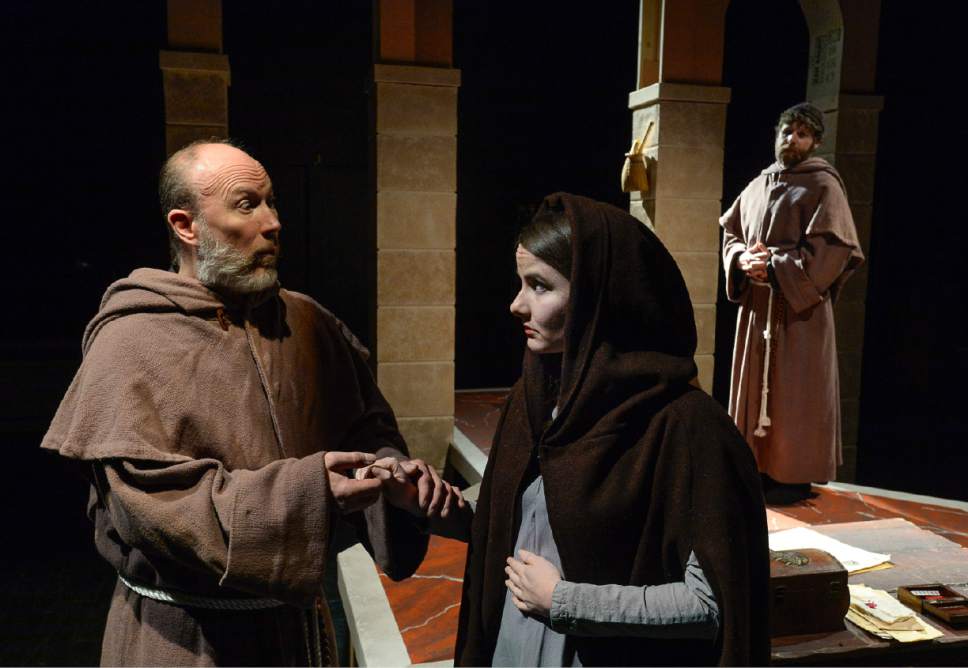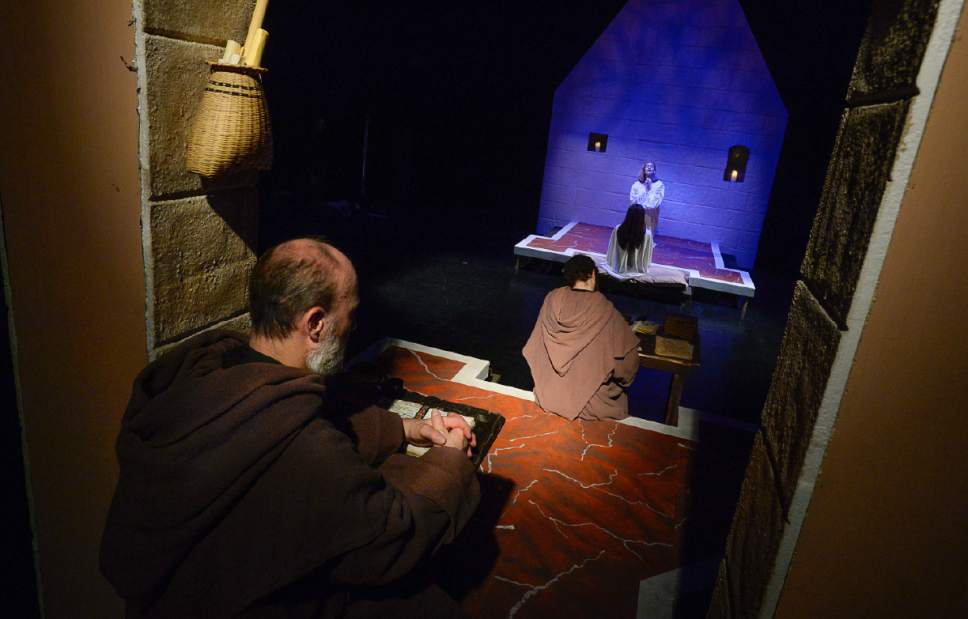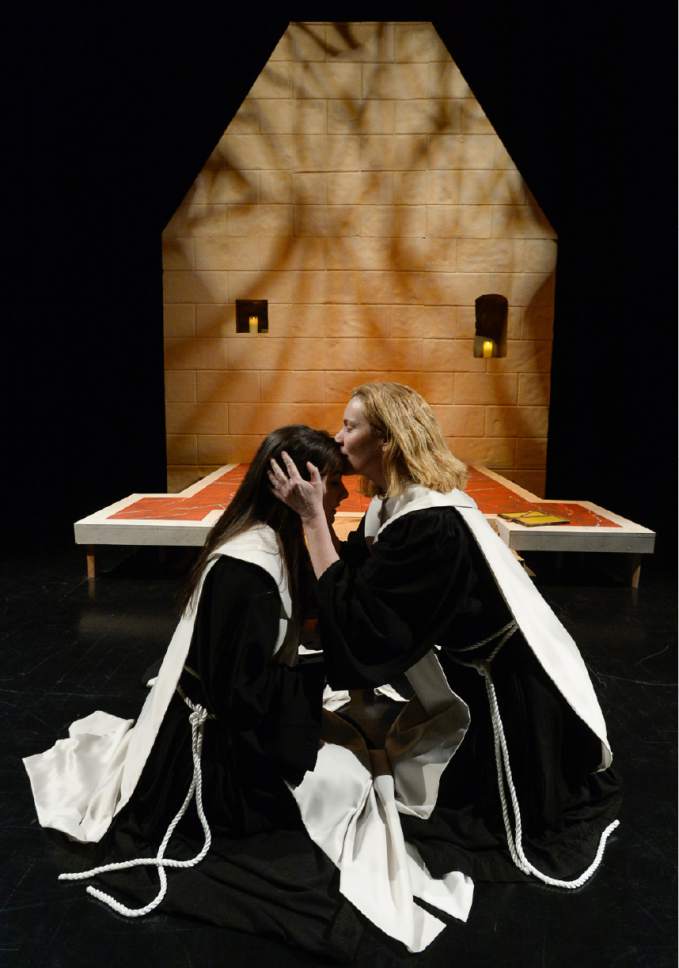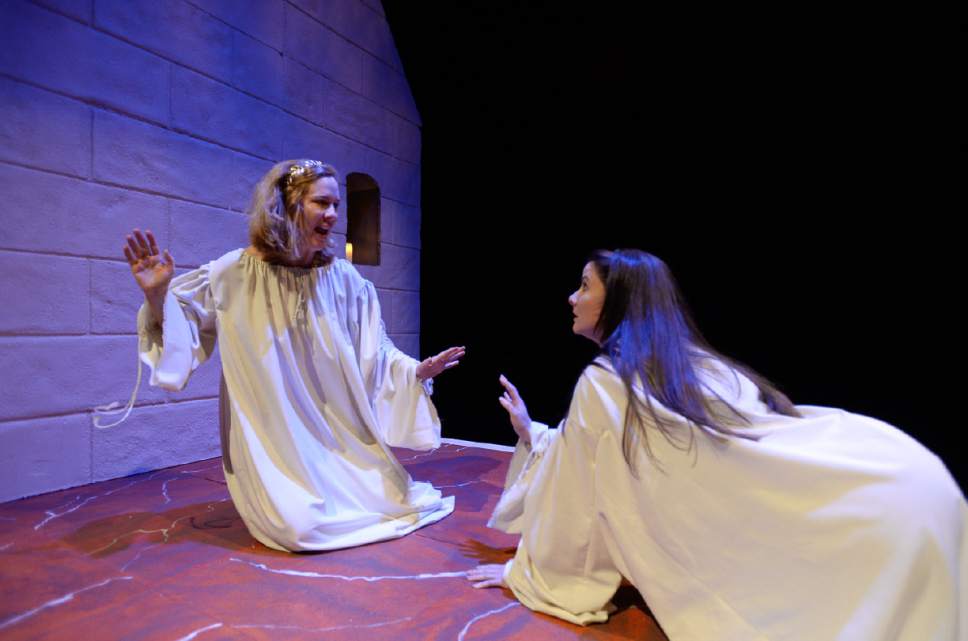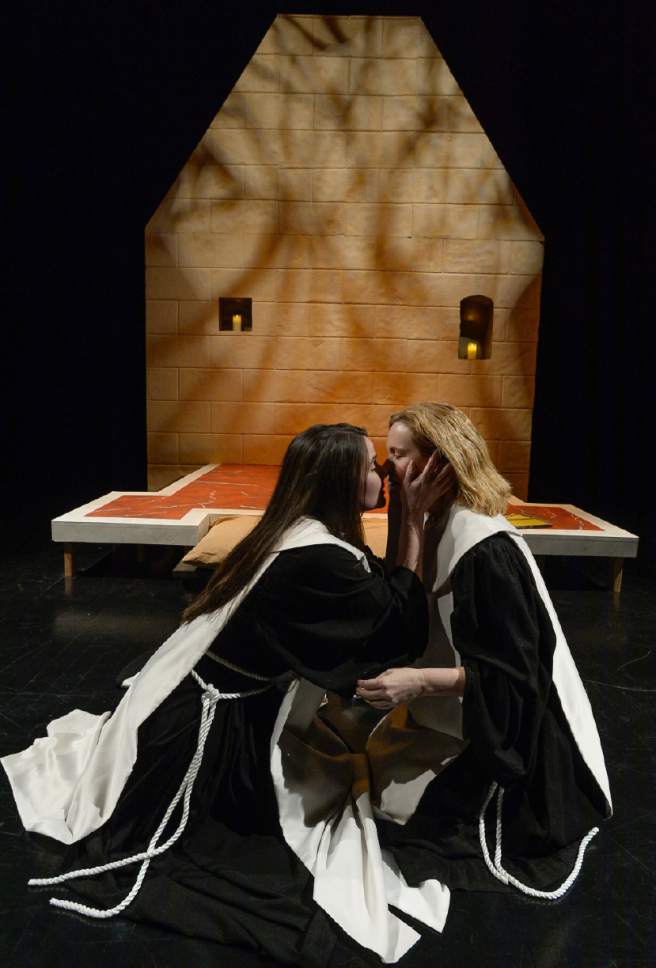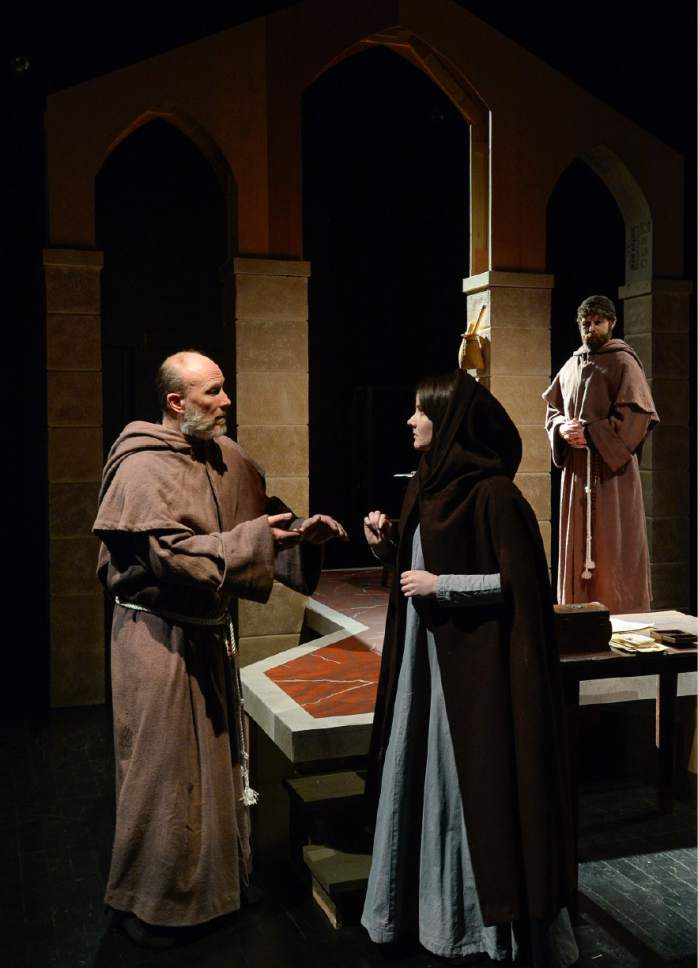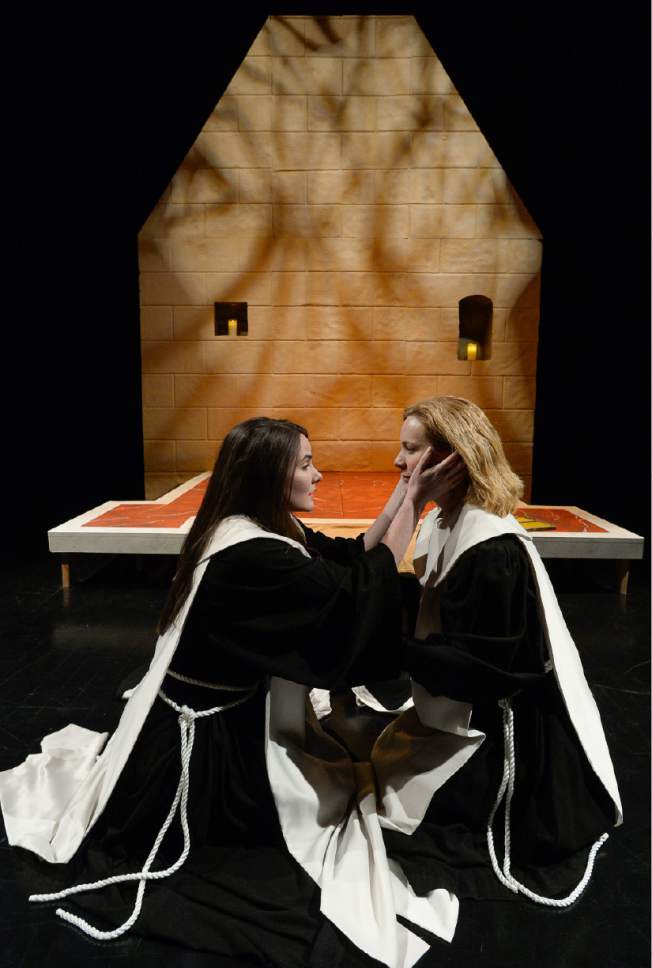This is an archived article that was published on sltrib.com in 2017, and information in the article may be outdated. It is provided only for personal research purposes and may not be reprinted.
Whatever is remembered about Hildegard of Bingen, a 12th-century Christian mystic, the truth of her life rising from between the pages of history books is even more compelling.
She wrote books about midwifery and herbal medicine. She was an untrained musician who created memorable music, including "Ordo Virtutum," a morality play that's considered the Western world's first opera.
But what made her known in her time were her fertile visions, which religious leaders, including the pope, considered messages from God. Which came, Hildegard claimed, from "the Living Light." Her visions were distinguished, remarkably in her time and in ours, because they were received by a woman.
Utah playwright Tim Slover explores Hildegard's faith during a time of emotional and sexual awakening in "Virtue," a play with music that's receiving a premiere production at Plan-B Theatre Company.
"Virtue" explores a time when Hildegard (Christy Summerhays) is transcribing her visions, aided by a new scribe, an aristocratic innocent young woman named Richardis (Emilie Starr). The women form a rich and enriching relationship, which Hildegard described with glowing intimacy in her letters, later denigrating the "ignorant minds" who separated them.
Many historians and biographers believed the women became lovers, which would have raised agonizing spiritual issues for Hildegard, who had earlier written against lesbian passions.
What is known, Slover says, is that Hildegard's visions changed dramatically once Richardis arrived. In the midst of dictating the spiritual lessons of her first book, "Scivias (Know the Ways of God)," she instead turned to writing "Ordo Virtutum (The Play of the Virtues)," a musical liturgy focusing on a war between good and evil over the outcome of one soul.
"I thought it would be interesting to try to catch Hildegard as a character in the moment when these events are landing on her rather than when she knew it all," Slover says.
Slover's play explores the seam between trying to follow the will of God and honoring scripture, balanced against new spiritual stirrings anchored in personal revelation. As Hildegard says in the play: "Forget the cramped religion you learned as a child. I have seen beyond it. Everybody's worthy. Or put another way: No one is."
"Virtue" takes seriously both spirituality and sexuality, "so I've taken the opportunity to turn off two different audiences at the same time," jokes the playwright, a theater professor at the University of Utah. Even that joke underscores his ambitious aim for "Virtue": He hopes the story is both specific and universal enough to lead to more notes of harmony between religious believers and the LGBT community.
Many of Slover's works are historical dramas, including 2006's "Joyful Noise," about George Frederick Handel, and 2004's "Treasure," about Alexander Hamilton, grounded in the dramatic art of making art from facts.
His plays feature authentic portraits, "my best efforts to make these people how history tells us they were," Slover says. "I think you have the right to make up plausible events of things that are known. From my point of view, this is exactly what happened. These are supposals. These supposals are based on real things."
At first, he says, he was puzzled by creating the language of the story, as it was set in 12th-century Germany, whose language he doesn't speak. He attempted to write period dialogue before realizing "whatever age you live in, you sound modern to each other," he says. "I think that if these people were talking to each other in the 12th century, these would be none of the words they would say, but they would sound like this to each other."
Creating a representation of Hildegard's music was another of the production's dramatic challenges. Music director Dave Evanoff presented the actors with guidelines and notes, and then Summerhays and Starr worked together to create their own interpretations within the rules of early music.
In the play, Richardis describes Hildegard's music this way: "These melodies — they swoop and they soar and they cross all boundaries," Starr quotes.
The actors draw upon musical skills that are a reversal of their characters. Summerhays was classically trained and surrounded by music from childhood, as her father was an opera singer. Hildegard had no musical training. Starr has a big voice and a musical ear, but doesn't read music, unlike her character, who studied music as part of her class's training. In this role, Starr hasn't been able to draw upon the power of vibrato, so she had to find other ways to express herself. "So much of my volume has been put into a very reverent space in my vocal register," she says.
Starr says she sat in her car practicing and recording her voice on her phone, using the 21st-century tool to create 12th-century harmonies with Summerhays.
The resulting melodies have "an otherworldly sound," Summerhays says. "It makes you feel like you're floating above the Earth rather then walking on it."
To Starr, "Virtue's" story seems prescient in the way it focuses on one woman whose voice was heard by her culture's most powerful leaders. "I think it comes at this amazing time in our lives when women are once again finding our voices, not letting ourselves be shut up, not letting ourselves be silenced," Starr says, referring to play rehearsals happening simultaneously with last month's women's marches across the country and at the Utah State Capitol.
Adds director Jerry Rapier: "Sometimes looking back is the only way to see the way forward."
facebook.com/ellen.weist —
Finding the virtues in 'Virtue'
Utah playwright Tim Slover explores the conflict between religious traditions and personal revelation through the story of 12th-century German abbess Hildegard of Bingen. The cast features Christy Summerhays, Jay Perry, S.A. Rogers and Emilie Starr. Direction by Jerry Rapier, with musical direction by Dave Evanoff, sound design by Cheryl Cluff, set design by Thomas George, costume design by Phil Lowe, lighting design by Jesse Portillo and props design by Arika Schockmel.
When • Feb. 16-26; 8 p.m. Thursday and Friday; 4 and 8 p.m. Saturday; 2 p.m. Sunday
Tickets • $20; $10 students; planbtheatre.org/virtue or 801-355-ARTS
Also • "Compline: A celebration of the life and music of St. Hildegard of Bingen"
When • Sunday, Feb. 19, 7 p.m.
Where • Cathedral Church of St. Mark, 231 E. 100 South, Salt Lake City
About • Margaret Toscano, associate professor of Classics and Comparative Studies at the University of Utah, will deliver a presentation about "Hildegard of Bingen: Lover of God and All Creation." Emily Nelson and Christopher LeCluyse, founders of Utopia Early Music, will offer insights into Hildegard's music in preparation for a Compline service featuring rarely heard pieces she composed.


